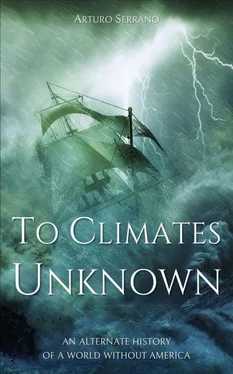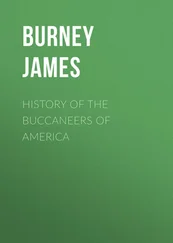All he had was starlight to go by, but he was sure he recognized that shape.
“José, point the telescope at the log next to those fish and tell me what you think.”
Mutis obeyed, found the innocent-looking driftwood, and had the same thought. Then he looked at the sea without the telescope and gave up any hope of estimating the distance by himself. “How much time do we have?”
“Minutes, at best. Don’t lose heart, José. This advance notice may make us the first travelers to ward off a submarine attack.”
“What? What do we do?”
Godin loosened the belt of his satchel. “Go to our room. Whatever happens, don’t let these papers leave your sight. Everything depends on this. I’m going to wake up the captain.” He fastened the satchel around Mutis’s shoulder and went off running inside the ship.
Mutis followed the stairs to the lower decks, walked into their room, and sat on his bed. His hands grasped Father Bartolomeu’s work with desperation. He’d grown up on a town of sailors, and believed he still remembered how to swim, but he wasn’t sure he’d be able to stay afloat while carrying a satchel that must stay dry. To his horror, he noticed his mind had started weighing how much more worth his own life was than the papers, and discarded the whole chain of thought.
After another minute, Godin entered the room, looking upset. “The captain won’t believe me. Come with me. You have to tell him what you saw in Cádiz.”
Mutis opened his mouth to ask something, but the entire ship was shaken by a sudden jerk. “They… they’ve started shooting.”
The next cannon ball let in a stream of ocean, and the rest of the night was chaos.
Morning, June 3 (Gregorian), 1756
Saint Peter and Saint Paul Archipelago
Mutis was still hungry, but he couldn’t stand eating another raw crab.
The submarine had pursued their ship relentlessly all night, launching shot after shot until there was no recognizable piece left for salvaging. Holding on to pieces of the hull, the two of them had been carried by the waves to a group of islets frequented by birds, where they had slept for less than an hour until the sun rose and they could take the true measure of their plight. Over the course of the morning, more pieces of the ship had been pushed to the shore. Once it was half a mast. Then it was two tables. Later, a sail wrapped around its own ropes. Every part had been destroyed.
They didn’t see any other survivors. Miraculously, Mutis still had the satchel.
Hopelessness descended over them as they walked around the small island and found it empty of humans. They were thousands of miles from the Brazilian coast, thousands of miles from Africa, and impossibly far from home. They were alone.
Godin knelt by the shore and started picking up what pieces of wreckage he could identify. One wooden spoon landed by his side.
“We’re going to die here,” said Mutis.
Godin shook his head. “No, thank you.”
“It’s true. If the Danish are patrolling this area, any ship that could rescue us will be sunk too.”
“You don’t know that.”
Mutis sat next to him and looked at the sea. “We may get used to the taste of raw crabs. But scurvy will catch up with us eventually.”
Godin threw the spoon at him. “You’re not helping!” Mutis blocked the blow covering his head with the satchel, and Godin gasped. “On second thought, maybe you are.”
Mutis lowered the satchel slowly. “What am I doing now?”
“Give me the satchel.” Mutis obeyed, and Godin started taking sheets of paper out. “The drawings are wet. We need to lay them out to dry.”
“What for? We have no way of taking them to Spain.”
“You’re wrong,” said Godin, suddenly very excited. “We have this.” He showed him one of the pages, blurry but still readable. “And we have that,” and he pointed at all the broken wood around them. “We even have a sail that we can repurpose.”
Seeing his partner’s intention, Mutis stood up. “That’s an absurd idea. We don’t have the tools.”
“We’ll make them. We have everything we need right here. Take these papers to higher ground, where the tide won’t reach them. We are getting out of here, and we are going home.”
Mutis took the sheets of paper and started walking uphill, hoping that the instructions would still make sense, that they would be able to reconstruct the descriptions in the right order, and that they would have enough wood to replicate the majestic bird machine designed by Father Bartolomeu, kept aloft by a fire that provided hot air and a series of cloth balloons positioned to keep it stable.
That was the secret the queen had sent them to dig up from boxes of forgotten notes, which held all her hopes for winning future wars, and which they were going to have to make work if they wanted to survive.
It was the design of a ship that could fly.
Night, August 19 (Gregorian), 1756
Above the Atlantic Ocean
“We could still go higher,” insisted Godin.
“Our firewood has to last the whole journey,” Mutis reminded him. “They’re the same stars anyway; you aren’t going to see them any better.”
With his arms over the handrail and his eyes still aimed at the sky, Godin replied, “I don’t care. I want to go further up, as high as God will let us.”
After the first days of travel, Mutis had learned to temper his fear of heights. From time to time they lowered the flying machine to catch fish, but he was still concerned about the risk of scurvy. “Can we see Saturn tonight?”
“Yes, it’s over there. If I had my telescope with me, I might be able to discover another moon around it.”
“What would you name it?”
“I don’t know. It’d have to be something dramatic, something memorable. For all we know, there could be a myriad of other planets out there that we cannot see because we haven’t flown high enough.”
Mutis thought for a moment. “If any moons are discovered because of a machine like this, the first one should be called Daedalus.”
“It’s a cautious choice,” nodded Godin. “You didn’t pick the name of the son who fell.”
“There will be falls, with enough time. We may think we found the way to outsmart the Danish, but someone will find the way to outsmart us.”
Oblivious to the warning, Godin let his mind fly in the direction of his gaze. “Do you know what kills me about studying the heavens?”
“What?”
“Learning that there are so many places up there and knowing that I’ll never visit them.”
“We’re already making history right here. We’re the first people to fly.”
“Yes, but now that I’ve reached the sky, I want to see what’s beyond it.”
“That didn’t end well for the people of Babel.”
“No, this is different. I can feel it. Right now, there could be an entire Danish fleet beneath us, and if we had any cannon balls to drop on them, they’d have no way of firing back at us. This changes the balance of war forever.”
Mutis kept his eyes pointed up so he wouldn’t see how far they were from the water. “Do you want to watch the sky or do you want to kill Danes?”
“After the queen gives us a welcoming worthy of heroes, she can go and kill as many Danes as she likes. I’m happy up here.”
Mutis forced himself to stare at the ocean and, resisting the immediate bout of vertigo, imagined a different constellation, a row of submarines ready for battle, unaware of the enemy that now rose beyond the reach of their cannons. “Maybe it’s the medic in me, but I can’t find the thought of war joyous.”
“Then don’t think about it.”
“How? War is coming either way. It will devour the world.”
Читать дальше












